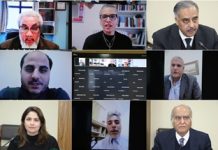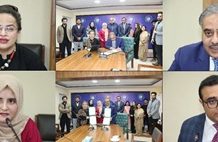Press Release
ACDC-ISSI Webinar
on
“The Role of Pakistan’s Peaceful Nuclear Programme in Socioeconomic Development”
November 11, 2021

“PAEC is a leading organisation developing national and international collaborations to enhance the applications of nuclear technology for achieving the sustainable development goals (SDGs) in Pakistan,” Dr Muhammad Naeem, Chairman, Pakistan Atomic Energy Commission (PAEC) said this in his keynote address at the Webinar on “The Role of Pakistan’s Peaceful Nuclear Programme in Socioeconomic Development.” The Arms Control and Disarmament Centre (ACDC) at the Institute of Strategic Studies Islamabad (ISSI) hosted the webinar on November 11, 2021.
While welcoming the guests, Ambassador Aizaz Ahmad Chaudhry, Director General ISSI, stated that while the nuclear capability provided security from the Indian aggression, it is also serving the people of Pakistan in every sector including energy, environment, agriculture and medicine.
Earlier in his introductory remarks, Malik Qasim Mustafa, Director ACDC-ISSI, said that Pakistan is making use of peaceful nuclear technology in almost all sectors including energy, agriculture, industry, medical, environment and other related areas to bring the socioeconomic development of the country. There are around 84 research and education institutes, 88 medical radiation facilities, 214 industrial radiation facilities, 5170 diagnostic X-ray facilities and 347 other radiation facilities are operating in Pakistan.
While providing a comprehensive overview of “Nuclear Power Generation and Energy Security” in Pakistan, Mr Parvez Butt, former Chairman PAEC, said that nuclear power is a mature technology and sustainable energy option. It is an essential part of the solution to the energy crisis in Pakistan, as it contributes to i) stabilizing electricity prices; ii) enhancing energy security; iii) and a clean environment.
In his remarks on “Application of Nuclear Technologies in Agriculture,” Dr Tariq Mahmud Shah, Director, Nuclear Institute for Agriculture and Biology (NIAB), highlighted climate change, yield stagnation, declining soil fertility, blasts and rusts as emerging threats. To augment the application of nuclear technologies in the agriculture sector, Pakistan should concentrate on mutation technique innovation and the advanced training of scientists and experts.
Mr Asghar Ali Khan, former Director, National Centre for Non-destructive Testing talked about “Application of Nuclear Technologies in Industry.” He sketched out the various industrial applications of nuclear techniques like non-destructive testing (NDT), radio-gauges, radiotracers, radiation processing, materials analysis and characterisation.
While expressing her views on “Use of Nuclear Technologies in the Health Sector,” Dr Shazia Fatima, Head of Nuclear Medicine Department, NORI, said that for a common man the word ‘nuclear’ is a synonym of ‘destruction’. There is a need to change the narrative and create awareness about the beneficial health applications of nuclear technology. Nuclear technology has not only revolutionised the field of hybrid imaging and oncology but also significantly improved the selection of appropriate therapy responses and personalised medicine.
The presentations were followed by an extensive question and answer session. Concluding the webinar, Ambassador Khalid Mahmood, Chairman BOG ISSI, said that Pakistan started its peaceful nuclear programme much earlier than its nuclear weapon programme. The nuclear community of Pakistan is dedicated to their national cause and their achievements must be recognised and promoted to a much larger scale.











